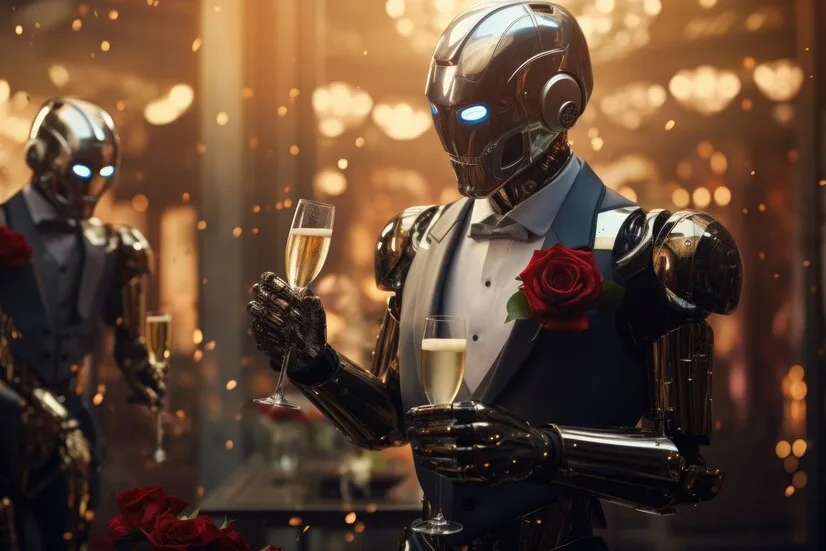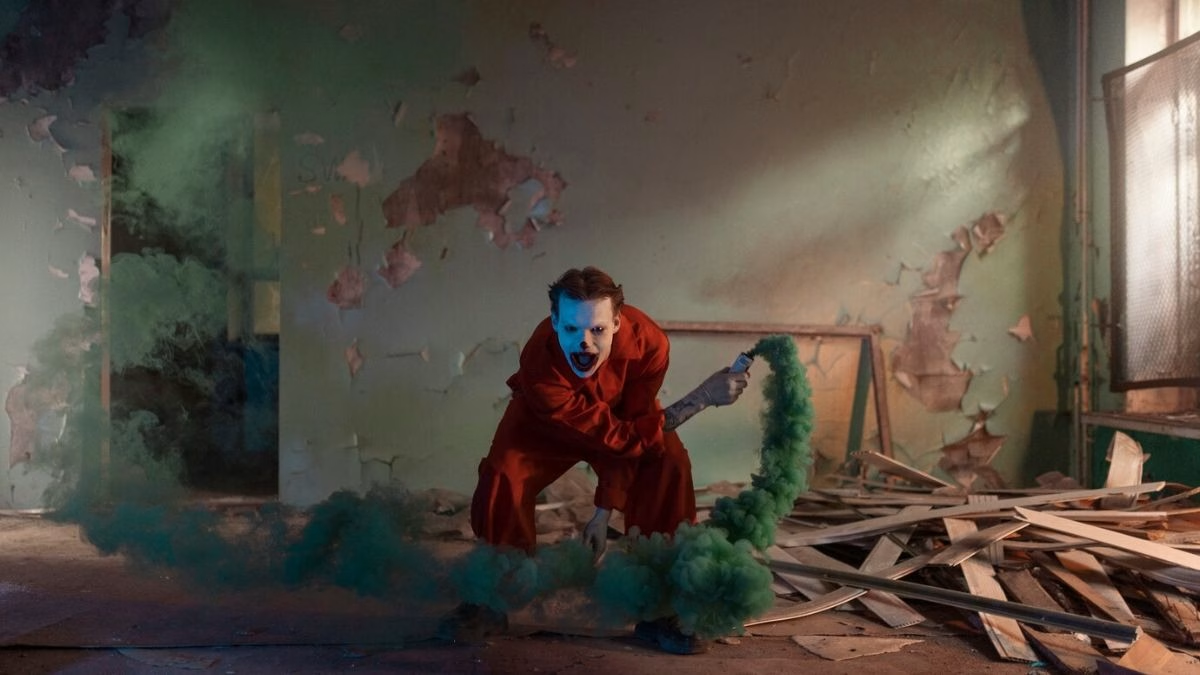BLOG
Sci Fi Robots nyt: From Tin Men to Thinking Machines

Sci Fi Robots nyt have long fired the imaginations of writers, filmmakers, and audiences alike. They sit at the intersection of technology and art, embodying our hopes, dreams, and often fears about the future. For fans of science fiction, robots are more than just machines—they’re emblematic of the possibilities and perils of technological advancement. In this blog post, we’ll explore how these mechanical beings have evolved within sci-fi narratives, from simple automata to complex thinkers, and what their stories tell us about our relationship with technology.
The Dawn of Mechanical Men
The concept of mechanical men can be traced back to the early 20th century. These tin men, often portrayed as clunky and devoid of emotion, represented our first forays into imagining artificial beings. Sci-fi authors were fascinated by the idea of creating life from metal and gears, sparking narratives that would lay the groundwork for future robot stories.
Early portrayals in literature and film focused on the novelty and wonder of these creations. They were often seen as extensions of human ingenuity, capable of performing tasks beyond our natural abilities. However, these tin men also raised questions about the ethical implications of creating life, setting the stage for more complex narratives in decades to come.
Despite their rudimentary nature, these early robots captured the public’s imagination, offering a glimpse into a future where mankind wielded power over life and technology.
Robotic Revolution in Sci-Fi Literature
The mid-20th century marked a shift in how robots were portrayed in science fiction. Writers like Isaac Asimov introduced the idea of robots with advanced artificial intelligence, capable of independent thought and decision-making. This era saw the birth of the thinking machine—a robot that could outsmart humans in logic and reason.
With this new level of complexity came stories that questioned the very nature of consciousness and identity. In novels like “I, Robot,” robots were no longer merely tools; they became entities with agency and moral considerations. Such stories challenged readers to ponder the implications of creating beings that could potentially surpass their creators in intellect.
The robotic revolution in sci-fi literature expanded the genre, providing fertile ground for exploring themes of autonomy, ethics, and the potential consequences of unchecked technological progress.
Silver Screens and Metallic Dreams
Cinema has played a pivotal role in shaping the public’s perception of robots. From the iconic “Metropolis” robot Maria to the beloved droid duo R2-D2 and C-3PO, movies have brought robots to life in vivid detail. These characters became cultural icons, influencing how society views the potential of robotics.
Films have the unique ability to visualize robots in ways that literature cannot, offering audiences a more tangible connection to these mechanical beings. Special effects and CGI have allowed filmmakers to push the boundaries of what’s possible, creating robots that are both awe-inspiring and terrifying.
Through cinema, robots have become central figures in narratives that explore themes of humanity, power, and survival, often serving as mirrors that reflect our own societal issues and anxieties.
From Programmed Servants to Independent Thinkers
The evolution of robots in sci-fi also mirrors advancements in real-world technology. Initially seen as programmed servants designed to obey human commands, robots have become increasingly autonomous within narratives. This shift reflects our growing understanding and implementation of AI in the real world.
Modern stories often depict robots as entities with personal motivations and desires, challenging the notion of human superiority. Such portrayals raise important questions about autonomy and rights—should a thinking machine have the same rights as a human if it exhibits similar cognitive abilities?
By transforming robots from simple helpers into independent thinkers, sci-fi narratives invite us to reconsider what it means to be sentient and how we define life.
Ethical Dilemmas and Moral Quandaries
With intelligent robots come ethical dilemmas that sci-fi explores with nuance and depth. How do we ensure that these creations act in accordance with human values? Can we trust them to make decisions that benefit society? These questions form the basis of many gripping narratives.
Sci-fi provides a platform for exploring the moral complexities of AI and robotics. Stories like “Ex Machina” and “Blade Runner” highlight the potential for conflict between creator and creation, forcing audiences to grapple with the consequences of playing god.
By examining these ethical dilemmas, sci-fi encourages us to think critically about the future of technology and its impact on humanity. It challenges us to consider the values we hold dear and how they might influence the development of intelligent machines.
A Vision of Tomorrow’s AI
Looking ahead, the portrayal of robots in sci-fi will likely continue to evolve alongside real-world technological advances. As AI becomes increasingly integrated into our daily lives, narratives will explore new dimensions of human-robot interaction and the potential consequences of blurring the line between man and machine.
Future stories may focus on the integration of robots into society, examining how they coexist with humans in various roles ranging from caregivers to companions. Such narratives could explore the emotional and psychological impact of forming bonds with AI entities.
By envisioning tomorrow’s AI, sci-fi offers a speculative glimpse into a future where humans and robots work side by side, prompting reflection on how these relationships could reshape societal norms and values.
The Role of Robots in Reflecting Human Nature
Throughout sci-fi history, robots have served as reflections of human nature, embodying our hopes, fears, and aspirations. They often act as lenses through which we examine societal issues such as inequality, discrimination, and the pursuit of knowledge.
Robots challenge us to confront our own flaws and biases, holding up a mirror to the darker aspects of humanity. By doing so, they provide valuable insights into the complexities of the human condition and the potential for growth and change.
Through their portrayal in sci-fi, robots remind us of the importance of empathy, understanding, and ethical decision-making in an increasingly technological world.
The Cultural Impact of Sci-Fi Robots
The influence of sci-fi robots extends beyond literature and film, permeating various aspects of culture. They inspire technological innovation, inform public discourse on AI, and shape our collective imagination about the future.
Robots have become symbols of progress and possibility, sparking interest in STEM fields among young minds. The cultural impact of these mechanical beings highlights the power of storytelling to inspire and drive change in both technology and society.
By captivating audiences with tales of tin men and thinking machines, sci-fi has left an indelible mark on our cultural landscape, fueling curiosity and creativity across generations.
Robots as Agents of Change
Sci-fi narratives often position robots as catalysts for change, whether as harbingers of doom or beacons of hope. These stories explore the potential for robots to revolutionize industries, redefine societal norms, and challenge existing power structures.
Robots can be seen as agents of both destruction and salvation, reflecting humanity’s ambivalent relationship with technology. By examining their role as change-makers, sci-fi encourages audiences to contemplate the impact of technological advancements on our lives and the world around us.
The Future of Sci-Fi Robots
As we continue to explore the possibilities of AI and robotics, the future of sci-fi robots remains wide open. Emerging technologies will inspire new narratives that push the boundaries of imagination and challenge our understanding of what it means to be human.
Future stories may address the ethical implications of AI-human integration, the role of robots in addressing global challenges, and the potential for collaboration between humans and machines. These narratives will continue to inspire critical thinking and provoke meaningful dialogue about the future of technology.
Conclusion
From their humble beginnings as tin men to their current status as complex thinkers, Sci Fi Robots nyt have captured the hearts and minds of sci-fi enthusiasts worldwide. Through their portrayal in literature and film, these mechanical beings offer valuable insights into the human condition and the potential consequences of technological advancement.
By exploring themes of autonomy, ethics, and societal transformation, sci-fi robots challenge us to reflect on the impact of AI and robotics on our lives and the future of humanity. They remind us of the importance of empathy, understanding, and ethical decision-making in an increasingly technological world.
BLOG
Kamiyab: A Symbol of Success, Ambition, and Cultural Pride

The word Kamiyab carries a profound meaning that transcends language and culture. Originating from Persian and Urdu, “Kamiyab” translates to “successful” or “victorious.” It is a term that embodies achievement, ambition, and the pursuit of excellence. In recent years, it has also become a popular name, brand, and cultural symbol, representing the aspirations and triumphs of individuals and communities. This article explores the significance of Kamiyab, its cultural and linguistic roots, and its impact as a symbol of success and pride.
The Meaning and Origins of Kamiyab
The word “Kamiyab” is derived from the Persian language, where “Kam” means “work” or “effort,” and “Yab” means “to find” or “to achieve.” Together, it signifies the attainment of success through hard work and determination. The term is widely used in Persian, Urdu, and other languages influenced by Persian culture, such as Hindi and Punjabi.
In addition to its linguistic roots, it holds cultural significance in regions where Persian and Urdu are spoken. It is often used to celebrate achievements, whether personal, professional, or communal. The term is also associated with positive attributes such as resilience, ambition, and perseverance, making it a powerful symbol of success.
Kamiyab as a Name and Brand
In recent years, Kamiyab has gained popularity as a name for individuals, businesses, and brands. Its positive connotations and universal appeal make it an attractive choice for those looking to convey a sense of achievement and ambition. Here are some ways in which it is used:
- Personal Names:
Kamiyab is a popular given name for boys in Persian and Urdu-speaking communities. Parents often choose this name to express their hopes and aspirations for their child’s future success and happiness. - Business Names:
Many businesses and organizations have adopted Kamiyab as part of their name to reflect their commitment to excellence and success. From restaurants and retail stores to consulting firms and educational institutions, the name Kamiyab conveys a sense of professionalism and ambition. - Cultural and Artistic Projects:
It is also used as a title or theme for cultural and artistic projects, such as films, books, and music albums. These works often explore themes of success, resilience, and the pursuit of dreams, resonating with audiences on a deep emotional level.
The Cultural Significance of Kamiyab
Kamiyab’s cultural significance extends beyond its linguistic meaning. It represents a shared value system that emphasizes hard work, determination, and the celebration of achievements. Here are some ways in which it holds cultural importance:
- A Symbol of Aspiration:
It embodies the aspirations of individuals and communities striving for success. It serves as a reminder that with effort and perseverance, one can overcome challenges and achieve their goals. - A Source of Pride:
For many, it is a source of pride and identity. It reflects the values and traditions of Persian and Urdu-speaking cultures, fostering a sense of belonging and cultural heritage. - A Motivational Tool:
The concept of it is often used as a motivational tool in education, sports, and personal development. It encourages individuals to set goals, work hard, and celebrate their achievements, no matter how big or small. - A Unifying Force:
It transcends linguistic and cultural boundaries, serving as a unifying force for diverse communities. It is a term that resonates with people from different backgrounds, promoting a shared understanding of success and ambition.
The Impact of Kamiyab
The impact of Kamiyab can be seen in various aspects of life, from personal development to cultural expression. Here are some ways in which Kamiyab influences individuals and communities:
- Empowering Individuals:
Kamiyab empowers individuals to pursue their dreams and overcome obstacles. It serves as a reminder that success is achievable through hard work, determination, and resilience. - Inspiring Creativity:
The concept of Kamiyab inspires creativity and innovation. Artists, writers, and musicians often draw on the themes of success and ambition to create works that resonate with audiences and reflect their own journeys. - Fostering Community Spirit:
Kamiyab fosters a sense of community spirit by encouraging people to celebrate each other’s achievements. It promotes a culture of support, collaboration, and mutual respect. - Promoting Cultural Exchange:
As a term with deep cultural roots, Kamiyab promotes cultural exchange and understanding. It introduces people to the values and traditions of Persian and Urdu-speaking cultures, fostering appreciation and respect for diversity.
Kamiyab in Popular Culture
Kamiyab has made its way into popular culture, appearing in films, music, literature, and social media. Here are some examples of how Kamiyab is represented in popular culture:
- Films and Television:
Kamiyab is often used as a title or theme in films and television shows that explore themes of success, ambition, and resilience. These stories resonate with audiences and inspire them to pursue their own dreams. - Music:
Many musicians and singers have incorporated Kamiyab into their lyrics and song titles. The term is used to convey messages of hope, determination, and triumph, making it a popular choice for motivational and inspirational songs. - Literature:
Authors and poets often use Kamiyab as a central theme in their works. It serves as a symbol of personal growth, achievement, and the pursuit of excellence, resonating with readers on a deep emotional level. - Social Media:
Kamiyab has become a popular hashtag and keyword on social media platforms. People use it to share their achievements, celebrate milestones, and inspire others to pursue their goals.
Lessons from the Concept of Kamiyab
The concept of Kamiyab offers valuable lessons for individuals and communities. Here are some key takeaways:
- The Importance of Hard Work:
Kamiyab reminds us that success is achieved through hard work and determination. It encourages us to set goals, stay focused, and persevere in the face of challenges. - The Power of Resilience:
The journey to success is often marked by obstacles and setbacks. It teaches us the importance of resilience and the ability to bounce back from adversity. - Celebrating Achievements:
Kamiyab encourages us to celebrate our achievements, no matter how big or small. It reminds us to take pride in our accomplishments and to recognize the efforts of others. - Fostering a Positive Mindset:
The concept of Kamiyab promotes a positive mindset and a belief in one’s ability to succeed. It inspires us to approach life with optimism, ambition, and a sense of purpose.
Conclusion: The Enduring Legacy of Kamiyab
In conclusion, Kamiyab is more than just a word—it is a symbol of success, ambition, and cultural pride. Its linguistic roots, cultural significance, and universal appeal make it a powerful concept that resonates with individuals and communities around the world. Whether as a name, a brand, or a cultural symbol, it embodies the values of hard work, determination, and the celebration of achievements.
As we navigate the challenges and opportunities of life, the concept of it serves as a reminder of the importance of resilience, ambition, and a positive mindset. It encourages us to pursue our dreams, celebrate our successes, and support others in their journeys. So, the next time you hear the word Kamiyab, take a moment to reflect on its meaning and the lessons it holds—you might just find the inspiration to achieve your own success.
BLOG
Darryl Baum: A Complex Figure in the World of Crime and Controversy

The name Darryl Baum is one that evokes a mix of curiosity, intrigue, and controversy. Known primarily for his involvement in criminal activities and his alleged connections to high-profile figures, Baum’s life and legacy are shrouded in mystery and speculation. While his story is often overshadowed by his criminal associations, it offers a fascinating glimpse into the complexities of urban crime, loyalty, and the consequences of a life lived on the edge. This article delves into the life, actions, and impact of Darryl Baum, exploring the man behind the headlines and the lessons his story holds.
Who Was Darryl Baum?
Darryl Baum was a New York City-based figure who gained notoriety for his involvement in criminal activities during the late 1990s and early 2000s. While much of his life remains undocumented, Baum is often remembered for his alleged ties to rapper 50 Cent (Curtis Jackson) and his role in a high-profile shooting incident that targeted the rapper in 2000. Baum’s life was cut short in 2000 when he was shot and killed, but his story continues to spark discussions about crime, loyalty, and the consequences of living a dangerous lifestyle.
The Life and Actions of Darryl Baum
Darryl Baum’s life was marked by his involvement in the criminal underworld, particularly in New York City. Here are some key aspects of his life and actions:
- Criminal Activities:
Baum was reportedly involved in various criminal activities, including drug trafficking and violence. His reputation as a dangerous figure in the streets of New York City earned him both fear and respect among those who knew him. - Alleged Connection to 50 Cent:
Baum’s name became widely known due to his alleged connection to rapper 50 Cent. In 2000, Baum was accused of being involved in a shooting that targeted 50 Cent, leaving the rapper with multiple gunshot wounds. The incident was a turning point in both men’s lives and has since become a significant part of hip-hop history. - Death and Legacy:
Darryl Baum’s life came to a violent end in 2000 when he was shot and killed. His death, like his life, remains shrouded in mystery, with various theories and rumors surrounding the circumstances. Despite his criminal past, Baum’s story has been immortalized in hip-hop culture and continues to be referenced in music and media.
The Significance of Darryl Baum
Darryl Baum’s significance lies in his representation of the darker side of urban life and the consequences of a life steeped in crime. Here are some reasons why his story is noteworthy:
- A Cautionary Tale:
Baum’s life serves as a cautionary tale about the dangers of criminal activity and the potential consequences of living on the wrong side of the law. His story highlights the risks and realities of a life marked by violence and crime. - Connection to Hip-Hop Culture:
Baum’s alleged connection to 50 Cent and the 2000 shooting incident have cemented his place in hip-hop history. The incident is often cited as a pivotal moment in 50 Cent’s career and has been referenced in his music and interviews. - Symbol of Urban Crime:
Baum’s life and actions are emblematic of the challenges and complexities of urban crime. His story sheds light on the social and economic factors that contribute to criminal behavior and the impact it has on individuals and communities. - Mystery and Speculation:
The mystery surrounding Baum’s life and death has fueled speculation and discussion. His story continues to intrigue those interested in true crime, hip-hop history, and the intersection of music and street life.
The Impact of Darryl Baum
Darryl Baum’s impact extends beyond his criminal activities and alleged connections. His story has influenced discussions about crime, loyalty, and the consequences of a dangerous lifestyle. Here are some ways in which his legacy continues to resonate:
- Influence on Hip-Hop Narratives:
Baum’s alleged involvement in the 2000 shooting of 50 Cent has become a part of hip-hop lore. The incident has been referenced in songs, interviews, and documentaries, contributing to the narrative of resilience and survival in the face of adversity. - Discussions About Crime and Consequences:
Baum’s life and death have sparked conversations about the root causes of crime and the impact it has on individuals and communities. His story serves as a reminder of the importance of addressing social and economic inequalities to prevent cycles of violence. - Exploration of Loyalty and Betrayal:
The circumstances surrounding Baum’s alleged involvement in the shooting of 50 Cent raise questions about loyalty and betrayal. His story highlights the complexities of relationships in the criminal underworld and the potential consequences of misplaced trust. - Cultural References:
Baum’s name continues to be referenced in popular culture, particularly in hip-hop music and media. His story has become a symbol of the dangers and realities of street life, influencing artists and audiences alike.
Lessons from Darryl Baum’s Story
The life and legacy of Darryl Baum offer valuable lessons for individuals and society as a whole. Here are some key takeaways:
- The Consequences of Crime:
Baum’s story underscores the potential consequences of a life steeped in crime. It serves as a reminder of the risks and realities of criminal activity and the impact it can have on individuals and their communities. - The Importance of Addressing Root Causes:
Baum’s life highlights the importance of addressing the social and economic factors that contribute to crime. By tackling issues such as poverty, lack of education, and limited opportunities, society can work towards preventing cycles of violence. - The Power of Resilience:
The 2000 shooting incident involving Baum and 50 Cent is a testament to the power of resilience. Despite facing significant challenges, 50 Cent was able to overcome adversity and build a successful career, serving as an inspiration to others. - The Complexity of Human Relationships:
Baum’s story sheds light on the complexities of human relationships, particularly in the context of loyalty and betrayal. It serves as a reminder of the importance of trust and the potential consequences of misplaced allegiances.
Conclusion: The Enduring Legacy of Darryl Baum
In conclusion, Darryl Baum’s life and legacy are a complex tapestry of crime, controversy, and cultural significance. While his story is often overshadowed by his criminal associations, it offers valuable insights into the realities of urban crime, the consequences of a dangerous lifestyle, and the power of resilience. Baum’s alleged connection to 50 Cent and the 2000 shooting incident have cemented his place in hip-hop history, ensuring that his story continues to be discussed and analyzed.
As we reflect on the life of Darryl Baum, we are reminded of the importance of addressing the root causes of crime, the power of resilience in the face of adversity, and the complexities of human relationships. His story serves as a cautionary tale and a source of inspiration, encouraging us to strive for a better future while learning from the past. So, the next time you hear the name Darryl Baum, take a moment to consider the lessons his story holds—you might just find a deeper understanding of the world we live in.
BLOG
02045996870 : Unraveling the Mystery Behind the Number

In an increasingly connected world, phone numbers have become more than just a means of communication—they are often gateways to stories, businesses, and even mysteries. One such number that has piqued curiosity is 02045996870. At first glance, it appears to be a standard phone number, but a closer look reveals layers of intrigue and potential significance. This article delves into the possible meanings, origins, and implications of 02045996870, exploring why it has captured the attention of so many.
What is 02045996870?
The number 02045996870 is a UK-based landline number, as indicated by the “020” area code, which covers London. The remaining digits, “45996870,” are unique to the specific line. While it may seem like an ordinary phone number, its appearance in various contexts has led to speculation about its purpose and significance.
Possible Interpretations of 02045996870
The number 02045996870 could represent several things, depending on the context in which it is used. Here are some possible interpretations:
- Business Contact Number:
One of the most straightforward explanations is that 02045996870 is a contact number for a business based in London. Many companies use landline numbers for customer service, sales inquiries, or general communication. The number could belong to a local business, a service provider, or even a startup. - Customer Support Line:
Another possibility is that 02045996870 is a customer support or helpline number. Businesses often dedicate specific numbers for customer service to ensure that inquiries are handled efficiently. This number could be associated with a well-known company or a niche service provider. - Scam or Spam Call:
Unfortunately, phone numbers are sometimes used for fraudulent activities. Scammers and spammers often use legitimate-looking numbers to deceive people into answering calls. If 02045996870 has been reported as a source of unsolicited calls, it could be linked to a scam operation. - Personal Number:
It’s also possible that 02045996870 is a personal landline number belonging to an individual or household. In this case, the number’s significance would depend on the person or family associated with it. - Marketing or Survey Calls:
Some organizations use phone numbers to conduct surveys, market research, or promotional campaigns. If 02045996870 has been used for such purposes, it could be linked to a marketing agency or research firm. - Virtual or VoIP Number:
With the rise of virtual phone systems and Voice over Internet Protocol (VoIP) technology, 02045996870 could be a virtual number used for business or personal purposes. These numbers are often used by remote workers, freelancers, or international businesses.
The Significance of 02045996870
The significance of 02045996870 lies in its potential to connect people, businesses, and services. In a world where communication is key, phone numbers like this one play a crucial role in facilitating interactions. Here are some reasons why 02045996870 might be significant:
- Facilitating Communication:
Whether it’s a business contact number or a personal line, 02045996870 serves as a bridge between individuals and organizations. It enables people to connect, share information, and resolve issues. - Building Trust:
For businesses, having a recognizable and reliable contact number like 02045996870 can build trust with customers. It reassures them that they can reach out for support or inquiries whenever needed. - Enhancing Accessibility:
A dedicated phone number makes it easier for people to access services or information. Whether it’s a helpline, customer support, or a personal contact, 02045996870 enhances accessibility and convenience. - Creating Awareness:
If 02045996870 is associated with a marketing campaign or survey, it can help raise awareness about a product, service, or issue. By reaching out to people directly, organizations can gather valuable feedback and insights.
The Impact of 02045996870
The impact of 02045996870 depends on how it is used and perceived. Here are some potential impacts:
- Positive Customer Experiences:
If 02045996870 is a customer support number, it can contribute to positive customer experiences by providing timely and effective assistance. This can enhance customer satisfaction and loyalty. - Exposure to Scams:
If the number is linked to scam or spam calls, it can have a negative impact on individuals who receive unsolicited or fraudulent calls. This can lead to distrust and frustration. - Business Growth:
For businesses, having a dedicated contact number like 02045996870 can support growth by improving communication and customer service. It can also help establish a professional image. - Data Collection and Insights:
If used for surveys or market research, 02045996870 can provide valuable data and insights that inform decision-making and strategy development.
Investigating 02045996870
Given the potential significance of it, it’s natural to want to investigate further. Here are some steps you can take to learn more about the number:
- Online Search:
Conduct an online search for it to see if it is associated with any businesses, services, or reports of scam calls. Websites like WhoCalledMe or TrueCaller can provide insights into the number’s reputation. - Social Media:
Check social media platforms for mentions of 02045996870. People often share their experiences with phone numbers on platforms like Twitter or Reddit. - Direct Contact:
If you feel comfortable, you can call the number to inquire about its purpose. Be cautious and avoid sharing personal information unless you are certain of the caller’s legitimacy. - Report Suspicious Activity:
If you suspect that it is being used for fraudulent purposes, report it to relevant authorities or organizations. In the UK, you can report scam calls to Action Fraud or your phone service provider.
Conclusion: The Mystery and Meaning of 02045996870
In conclusion, 02045996870 is more than just a phone number—it is a potential gateway to stories, services, and connections. Whether it’s a business contact, a customer support line, or a personal number, its significance lies in its ability to facilitate communication and build relationships. However, like any phone number, it can also be misused for scams or spam, highlighting the importance of vigilance and caution.
As we continue to navigate the complexities of the digital age, numbers like 02045996870 remind us of the power and potential of communication. They serve as a reminder to stay informed, connected, and aware of the world around us. So, the next time you encounter a number like it, take a moment to consider its significance—you might just uncover a story worth telling.
-

 GAME6 months ago
GAME6 months agoMastering the Fire Kirin Login Experience
-

 BLOG8 months ago
BLOG8 months agoPepper0 Mother and Son
-

 BUSINESS8 months ago
BUSINESS8 months agoWhy Your Business Needs an Elite Eagle Product Partner for Growth
-

 FASHION10 months ago
FASHION10 months agoold fashioned news source nyt crossword
-

 BLOG10 months ago
BLOG10 months agoCzech Harem: Understanding the Controversial Phenomenon
-

 BLOG10 months ago
BLOG10 months agoBunkr Albums: A Comprehensive Guide
-

 NEWS10 months ago
NEWS10 months agospencer new york news: A Comprehensive Guide
-

 BLOG7 months ago
BLOG7 months agoEntreTech.org: Empowering Entrepreneurs Through Technology
